
Calog range of process control calibrators
These calibrators have both the precision specifications for instrumentation workshops and the robust construction that is important for use in rough industrial areas, from control rooms to field applications.
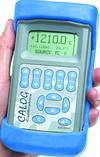
The instruments feature backlit graphics with user-friendly menus. Settings allow the user to customise the Calog to suit the way they prefer to work - and the help menu displays working examples and connections. Measurement displays can be in digital form with five clear numerals or, with a click in the menu, a trend graph with programmable timebase. This is useful for optimising PID controllers or logging temperatures. Source values are easily selected with the 'key-per-digit' setting or using the step, auto-step or ramp functions. Modern 'serial technology' components are used in graphics, memory, A/D and D/A to considerably reduce the size, producing a truly portable, powerful calibrator. Nickel metal-hydride batteries and cellphone-based battery management systems ensure a full day's field work.
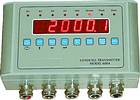
Specifications and features for the various models
Calog Loop - loop calibrator
* Measure, source and simulate 0 to 24 mA accurate to within 0,01% and at 1 µA resolution.
* Measure 32 V accurate to within 0,005% and at 1 mV resolution.
* Continuity test function.
* Increment, step, ramp or valve stroking.
* Trend logging with programmable timebase.
* Displays values in mA and % or % and mA.
* Built-in 24 V power supply.
This unit contains functions for use during the installation and maintenance of all powered and non-powered current loops.
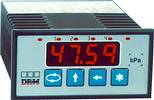
Calog-TC - thermocouple calibrator
* All the features of the loop calibrator as well as:
* Measure and source types J, K, T, E, R, S, B, N, W3, and W5 thermocouples, with configurable internal or manual cold-junction compensation, in either °C, °F, Kelvin or Rankine.
* Accuracy better than 0,5°C excluding cold junction errors and thermocouple errors with a resolution of 0,1°C.
* Measure and source -10 to 100 mV to within 0,01% and at 1 µV resolution.
* Simultaneously source a thermocouple and measure mA (not isolated).
This unit is suitable for testing, measuring and calibration of all thermocouple-based systems. It may also be used for all powered and non-powered milliamp loops. The trend feature is useful for graphing temperature profiles and PID controller optimising.
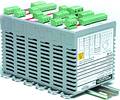
The company
Digital Process Measurement was formed in 1989 to specialise in the design and manufacture of high quality process control instrumentation. The company developed a new panel indicator that would prove to be superior to any of the products currently available.
The original assembly lines that were put in place were using advanced assembly methods comparable to those used in Europe. It took only two months to get a basic line of instruments into production and within the first year DPM was in the position to boast that it was the largest manufacturer of panel meters in the country. DPM was the first to manufacture non-programmable panel instruments that provided the user with full adjustability from the front panel.
By 1992, DPM celebrated the production of its 20 000th instrument and with ongoing research and development, launched its first fully programmable panel meter in 1993. The company now offers a full range of low-cost fully programmable process control instruments; DIN-rail and field mount transmitters, belt weighers, dynamometers, and more.
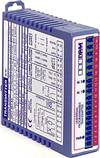
Today
DPM's vision and focus concentrates on supplying superior quality products at competitive prices. This strong motivation has led to the attainment of the ISO 9001 quality assurance system. Most of DPM's products meet the European EMC directive 89/336/EEC and Low Voltage Directive 73/23/EEC (CE mark). A further credit to the company came in 1997, when it was recognised as a 'Technology Top 100' company in South Africa. In 1999, DPM was awarded the Electronic Industries Federation Award for 'Outstanding Achievement in Growth, Innovation and Exports'.
People
From inception, the people at DPM have been one of the company's most important assets and a large majority of the staff that joined in 1989 are still in its employ. It is company policy to ensure that the staff is empowered in their workplace by improving their skills.
Staff from all levels within the organisation are encouraged to study further, and with the result, DPM has sponsored a number of technical courses as well as other tertiary qualifications. Another very valuable facet of staff improvement is the concept of 'job rotation', which allows employees to increase their abilities and understanding.
Product range
Through careful design considerations and using the latest manufacturing techniques, DPM's 'future generation' flash memory microcontroller indicators offers features usually only found in the more expensive units, offering significant cost savings. Internationally, the range is a breakthrough in design technology. While instruments of this quality usually carry heavy price tags, DPM is able to provide instrumentation with programmable advantages at analog prices.
Two important influences in attaining this price competitiveness are, firstly, the use of a hybrid philosophy in component selection, with a combination of surface mount and through-hole components. The best available components are used which enables instruments to achieve overall accuracy tolerances as small as 0,05 %. Secondly, in order to increase production throughput, DPM has invested in computerised calibration facilities with dedicated software to test instrument functions. This system can supply full reports for customers as well as internal reports.
DPM's range of process control products include:
* Programmable indicators.
* Miniature indicators.
* Programmable transmitters.
* Integrators and totallisers.
* Belt weighers.
* Dynamometers.
* Counters and frequency meters.
* Loop powered products.
* Transmitter power supplies.
* Bar graph displays.
* Extra large displays.
* Calibrators.
DPM locally
DPM services a network of distributors throughout South Africa, which are supported with regular newsletters detailing new products, upgrades and any changes in instrumentation. DPM also send technical support personnel to these distributors so that the end-user and customer can obtain a personalised service, catering to their specific need. This strategy of inter-action and communication at the ground level allows DPM to be a front-runner in the field of research and development to continually innovate the product range to meet customers' requirements.
DPM internationally
In order to keep abreast in worldwide trends (and often pre-empt these trends) DPM regularly participates in international shows. Its success is demonstrated by the fact that about 25% of manufactured products are exported internationally. DPM currently supplies to Australia, Malaysia, Turkey, United Kingdom, USA, Germany and Holland. DPM is continually establishing distributorships in other countries worldwide.
For more information contact Pierre Stasio, Digital Process Measurement, 011 462 2204, www.dpm.co.za
© Technews Publishing (Pty) Ltd | All Rights Reserved